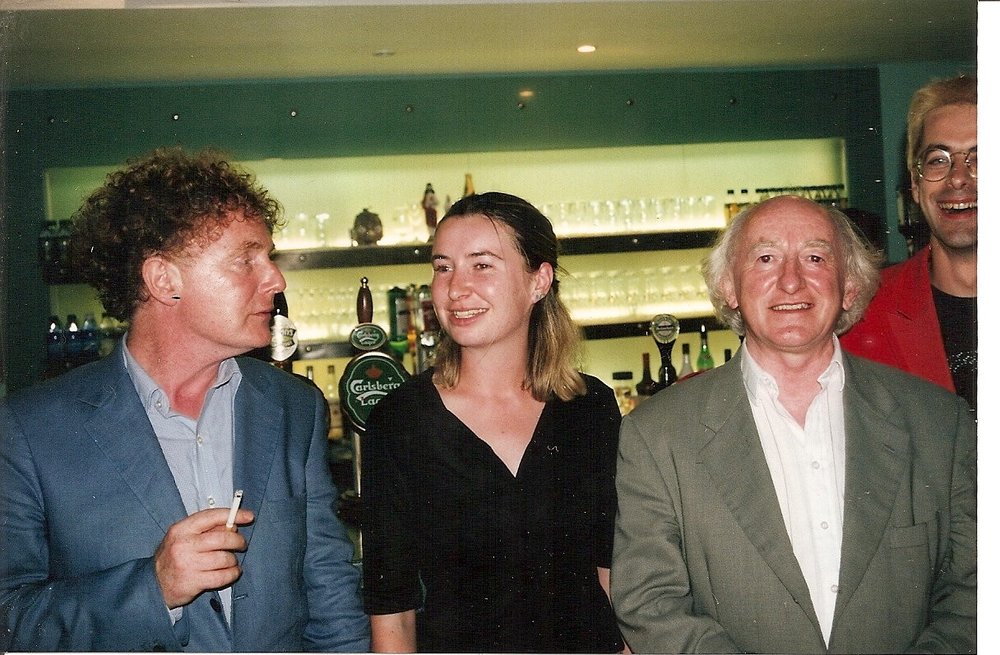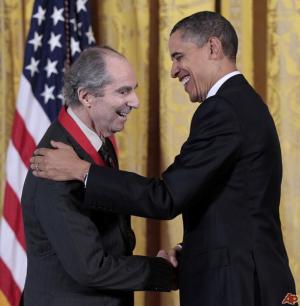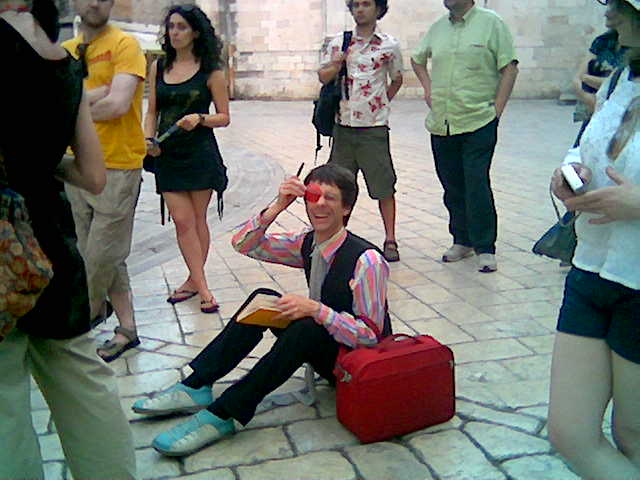Here (hot from my inbox!) is a sneak preview of an illustration, and a chapter, from Jude in London (due to be published in September). In the picture, Jude is about to find out if he has won the greatest prize in art - the Turner of Turners. The crowd lift him aloft... his former lover, Babette, flips a golden coin...
No, I won't tell you who is sneaking up behind him with a gun.
 For now, clicking on the picture takes you to the first book. Which is also excellent.
For now, clicking on the picture takes you to the first book. Which is also excellent.
And here's some free new book to go with the picture. This is from a little earlier on, before the prize ceremony... Enjoy...
(Oh, by the way, the artist, Gareth McNamee Allen, once did this fine homage to Tayto crisps for my old band, Toasted Heretic's first album, Songs for Swinging Celibates. There's more of his work on his website. Top chap... OK, here we go... )
From Jude in London...
CHAPTER 80
I entered Tate Modern. The floor sloped away and down, beneath a high walkway, and out into one enormous Room. I walked for a long time, until I was in the centre of the Room, and looked around. I was obviously very early, for the Art had not arrived yet. Certainly there was more than enough blank space on the walls for it. It was a room into which you could have fitted Galway City’s great Car Park of the Roaches itself. I had never seen the like. Its scale was inhuman. Yet the Tate Family evidently still lived here, and spent all their time in this room, for their possessions lay all about me. At the far end of the room, and proof I was in the right place, a stage stood before a backdrop of vast, dead television screens. Great lights, unlit as yet, hung above the stage from steel beams.
No doubt the Prize-Giving will take place upon that stage. Oh, I hope they will not be too disappointed that I have neglected to create any Art …
Perhaps I could make up for my failure by helping to get the place ready, before the other artists’ Art arrived. I looked all about me.
There was very little furniture in the room, and that in bad order. The bed in the far left corner was in most need of attention, the sheets crumpled and filthy. The last party had obviously congregated here, for on the bed, the rug, and the surrounding floor, were empty cigarette packets, stubbed butts, vodka bottles and general debris.
 Ceci n'est pas un litIt was an easy matter to collect the rubbish, turn the mattress, shake out the sheets, plump the pillows, and remake the bed. This ritual, familiar to me from the Orphanage, soothed. I sang softly as I worked. Too soft a sound to rebound in echo from the bare walls.
Ceci n'est pas un litIt was an easy matter to collect the rubbish, turn the mattress, shake out the sheets, plump the pillows, and remake the bed. This ritual, familiar to me from the Orphanage, soothed. I sang softly as I worked. Too soft a sound to rebound in echo from the bare walls.
The fish tank proved trickier than the bed. Enormous though the tank was, the fish was far too big for it. I estimated the poor creature at thirty-five feet. Presumably, in the way of family pets, it had simply outgrown its accommodation. The older Tate children, who loved it, had themselves, I supposed, reached adolescence, and become too busy to care for it: and the aging parents slowly forgot it, in its forty foot tank in the far right corner. It appeared to have been dead for some time. Bubbles of decomposition rocked it occasionally in the thickening water, as they emerged from the decaying grey flesh. The top of the tank was sealed, which cannot have been healthy for the fish while it lived. Certainly, it made my task of emptying and cleaning the tank more difficult than it needed to be.
 Ceci n'est pas un poissonWhen I was finally done with the fish tank, I examined the room in more detail. The place was in a shocking state. The closer I looked, the more shocked I was. The very basics of child-rearing seemed to have been neglected by the Tate parents. Neither the young Tate children nor their many pets seemed to have been adequately toilet trained. There were lumps of elephant dung everywhere. Some had even stuck to the paintings, and dried there. It was a hell of a job to get it all off.
Ceci n'est pas un poissonWhen I was finally done with the fish tank, I examined the room in more detail. The place was in a shocking state. The closer I looked, the more shocked I was. The very basics of child-rearing seemed to have been neglected by the Tate parents. Neither the young Tate children nor their many pets seemed to have been adequately toilet trained. There were lumps of elephant dung everywhere. Some had even stuck to the paintings, and dried there. It was a hell of a job to get it all off.
The children themselves seemed to go anywhere. I even found a bottle of urine with a crucifix in it. Sighing, I retrieved our Lord Jesus on his cross, and hung him back up on a clean wall.
I began to clean the handprints and splashes of dried mud off the end wall.
As I worked, others quietly entered the enormous room. Some introduced themselves to me, and shook my hand.
“Judges,” they murmured.
“Brian Eno,”
“Brian Sewell,”
“Brian Balfour-Oatts.”
“Fascinating piece.”
“Please, ignore us.”
“Carry on, carry on.”
They crept into the shadows, murmuring.
“And while dressed as a rabbit! Brilliant!”
“I thought Mark Wallinger’s Sleeper couldn’t be improved on, but by golly…”
“I beg to differ…”
I finished cleaning the wall, and looked around. Still a great deal of work to do, to get the place ready … Unbelievable that a family as rich as the Tates lived in such squalor. Nothing seemed to work. I decided to fix the fluorescent light, which had been flickering erratically since I’d arrived. I tracked the fault to a hidden timer that someone had mistakenly set to turn the light on and off again every minute or so. It was a simple matter to route the circuit around it.
Even their big, new, colour television seemed broken. I couldn’t get any sound out of it. It was showing a rather dull film, about a woman trying to clean a shower. The pictures had gone very slow for some reason, and were in black and white. The whole thing seemed banjaxed. I switched it off.
Then I picked up some old firebricks, which had been left lying where someone might trip. Gasps came from the shadows. Brian Sewell clapped.
I put the firebricks in an old, water-damaged shed. Its overlapping boards and weathered paint reminded me of the lakeboats of Lough Derg. A pleasing warm feeling rose in me.
Now to deal with the graffiti.
The older Tate children seemed to have thrown several parties recently, without the benefit of parental supervision. Many of their friends had scrawled their names, and worse, across all kinds of objects and surfaces. I set to scrubbing. An illiterate fellow called Chris, from County Offaly, seemed to be one of the worst offenders. I was sad to see a fellow Irishman letting the side down. “Ofili” indeed.
Tired, and in need of a break after removing the graffiti, I looked for the toilet facilities. A urinal was mounted in the centre of the room. It was mounted at a curious height, and on its back: but no doubt that was the modern way. Oh, more fecking graffiti… On its rim someone had scribbled their name, and the date or time of the party. R. Mutt. 1917? 19.17? 7.17pm? I carefully scraped it off, before urinating.
 Ceci n'est pas un urinoir
Ceci n'est pas un urinoir
(There you go. Feel free to comment below, or explore more of the book for free here.)
 The ebook version of my collected poetryI got a fan email last month, from Japan, about a poem I once wrote. This — trust me — doesn’t happen very often.
The ebook version of my collected poetryI got a fan email last month, from Japan, about a poem I once wrote. This — trust me — doesn’t happen very often.











